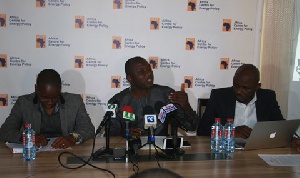 From left: Dr Ishmael Ackah, Mohammed Amin Adam and Benjamin Boakye
From left: Dr Ishmael Ackah, Mohammed Amin Adam and Benjamin Boakye
Energy think tank Africa Centre for Energy Policy (ACEP) has said the power purchase deal between KARPOWER and the Government of Ghana is worse than the controversial $510 million separate power purchase deal between AMERI Energy and the Government of Ghana.
The annual capital recovery charge fixed M&O for the 225MW Karpower plant amount to US$118.4 million. The total payment in 5 years amounts to US$592 million. KARPOWER is a 10-year deal so year 6-10 will have an additional fix cost of $495.8million, according to ACEP. The variable charge for the deal is US$15.2 million while standby guarantee is US$50 million.
As far as transfer of ownership to Ghana is concerned, Ghana will take no ownership after 5 years, nor after 10 years when the agreement comes to an end. It is a Power Purchase Agreement (PPA), ACEP said in a statement Wednesday. Per the deal, Government Consent and Support Agreement (GCSA) is applicable and a breach of GCSA and ECG’s event of default could lead to suspension of services by KARPOWER.
Liquidated damages on full commercial operation default before commercial operation date is US$300/MW while the stability clause of the agreement said no change of law affects the contract. Equilibrium clause is provided where there is a cost effect.
Karpower Ghana is also exempted from all applicable taxes including personnel income tax. The Government Consent and Support Agreement guarantee this. Also, the limitations of liability are not more than 10% of only the annual capital recovery fee.
ACEP, in a statement, welcomed the request by President John Mahama to PricewaterhouseCoopers (PwC) to undertake a value-for-money analysis of the controversial AMERI deal through financial modelling aimed at providing a guide to ensure value for money in future negotiations on the procurement of power.
The President made the announcement Tuesday at a press conference at the Flagstaff House.
According to Norwegian newspaper, VG, Ghana could have bought the 225MW AMERI plants at $220 million instead of the $510m Build, Own, Operate, and Transfer (BOOT) agreement reached between the government of Ghana and AMERI Energy.
However, ACEP said: “While we commend the President for this laudable step in unearthing the problems associated with the AMERI deal, we are of the view that the scope of the work should be expanded to cover the Power Purchase Agreement between ECG and KARPOWER, a different arrangement for procuring power into the country.”
“This is especially so because our analyses of the KARPOWER deal with ECG reveals another case of poor diligence. Further review of the deal shows that it is worse than a Build Own Operate and Transfer (BOOT) arrangement under which AMERI was procured. A typical PPA should have been over 20 years to spread the cost and thereby reduce the burden on consumers, unlike the 10-year deal negotiated for the Karpowership.
We propose that in undertaking this exercise, PwC, will consider the following concerns:
1. Whether the use of BOOT or BOT is cost-effective and has value for money in procuring power projects;
2. Whether Government should continue with the policy on promoting IPPs rather than getting involved in the procurement of power plants;
3. Whether such power procurements should be negotiated and signed with VRA, the state-owned generator, or the Ministry of Power;
4. Whether in sourcing IPPs it should not be done through competitive bidding;
5. Whether our regulator, PURC, has been conducting due diligence and setting the appropriate benchmarks on PPAs to ensure that consumers are not saddled with higher tariffs, given that PPAs do not require parliamentary approvals.
We also think that the reason for this exercise falls short of the requirements of probity and accountability. In our view, the study should also provide relevant information to accountability institutions to investigate the circumstances under which a deal so cloaked with controversies was negotiated for the country; and to punish those found to have exercised such extreme indiscretion and bad faith in negotiating the deal.